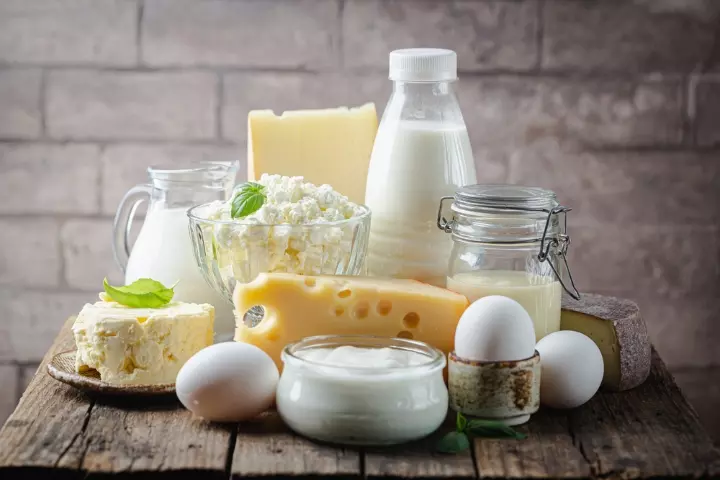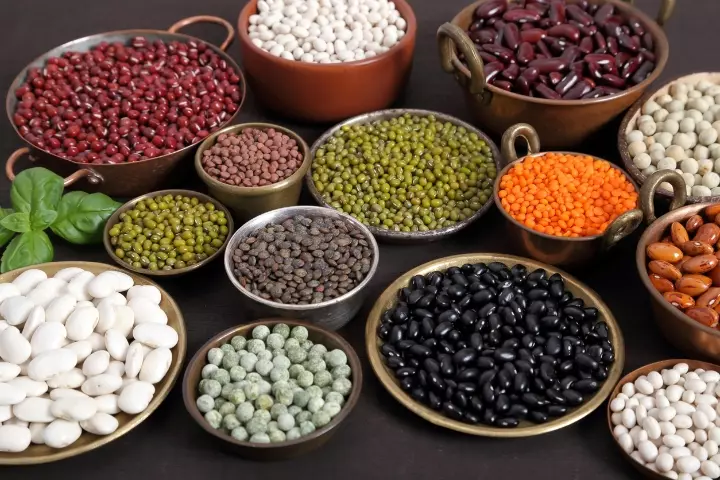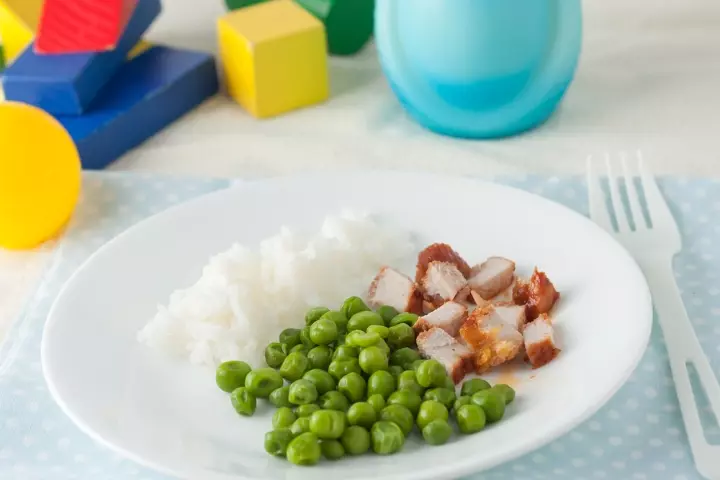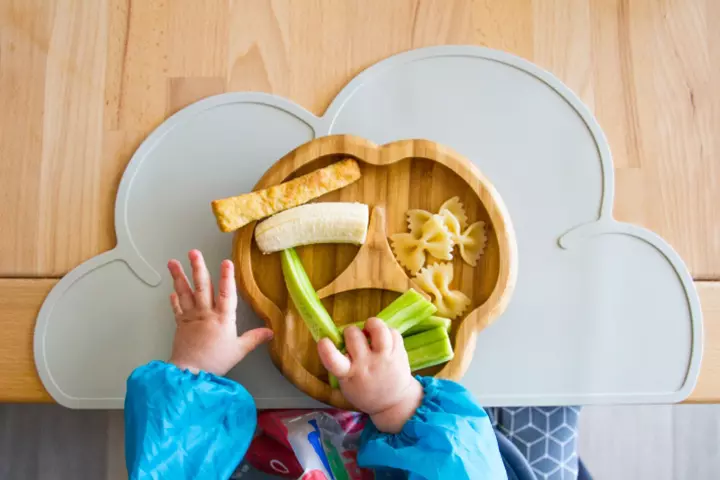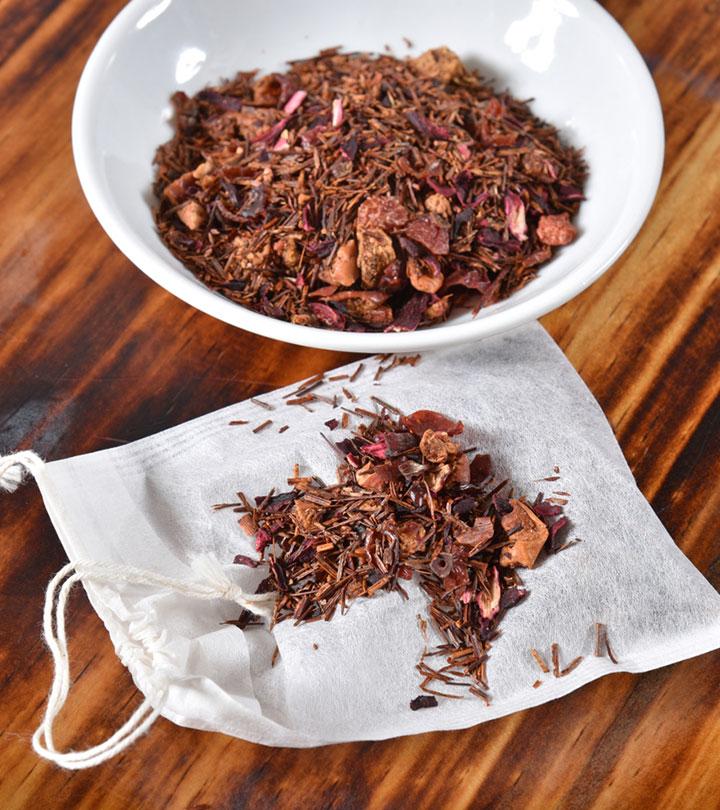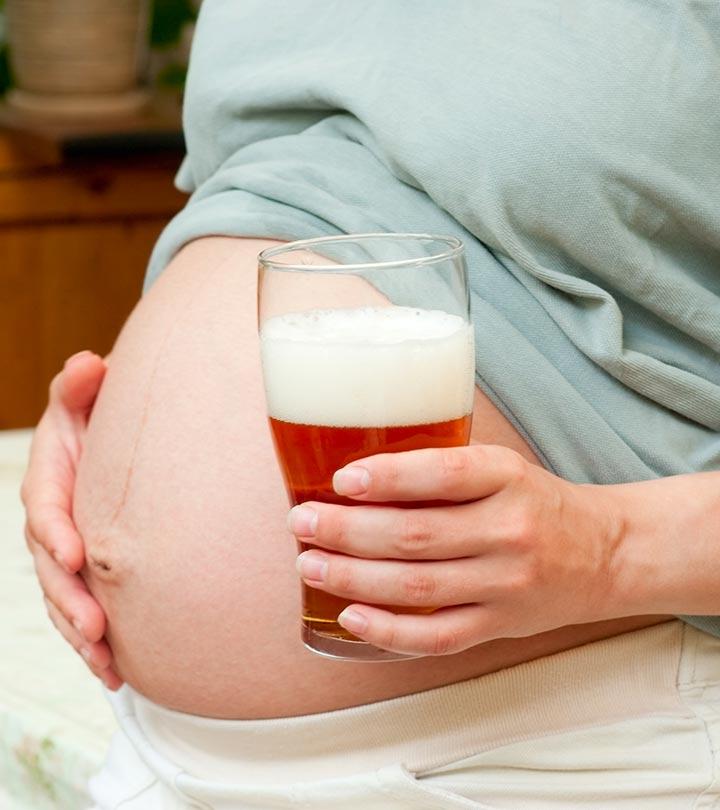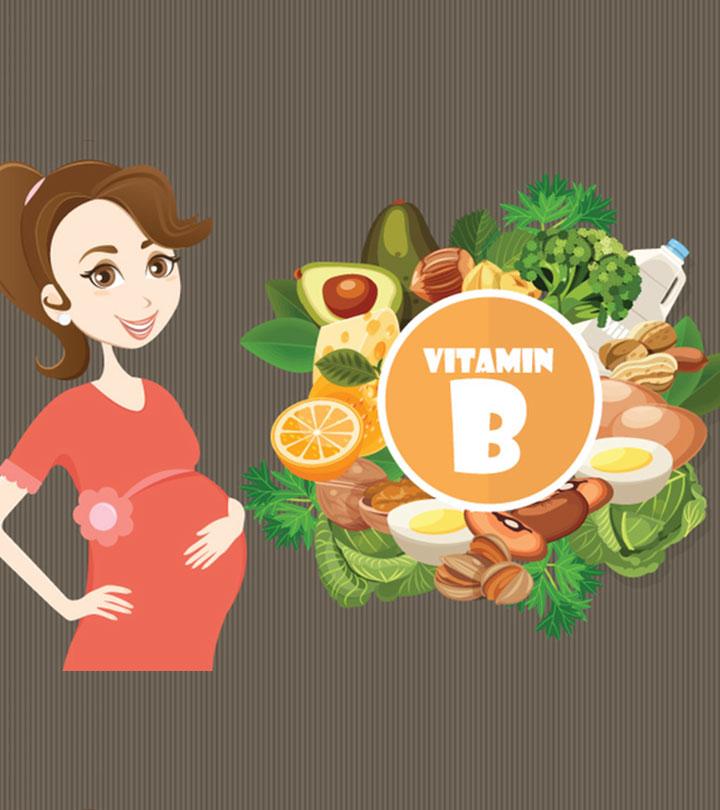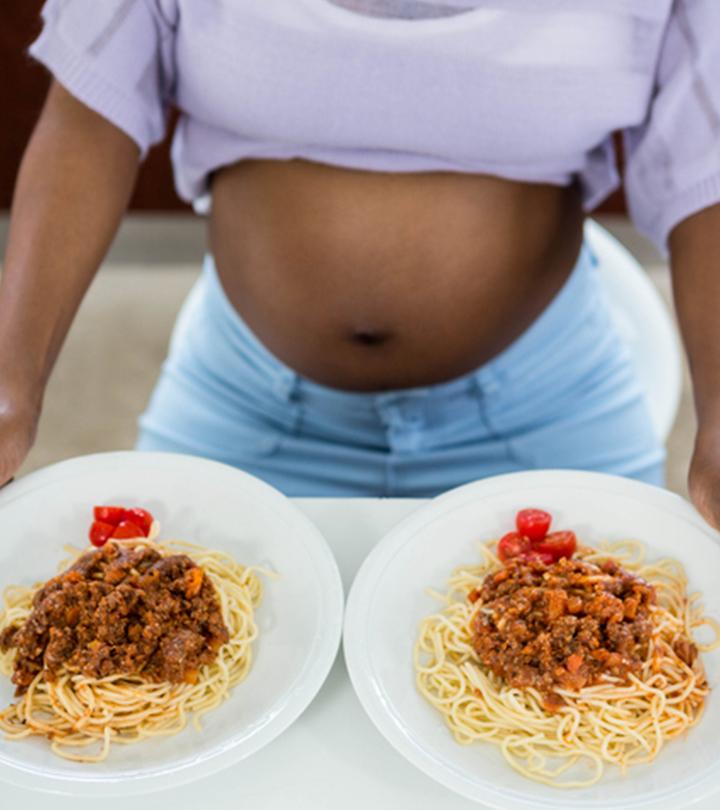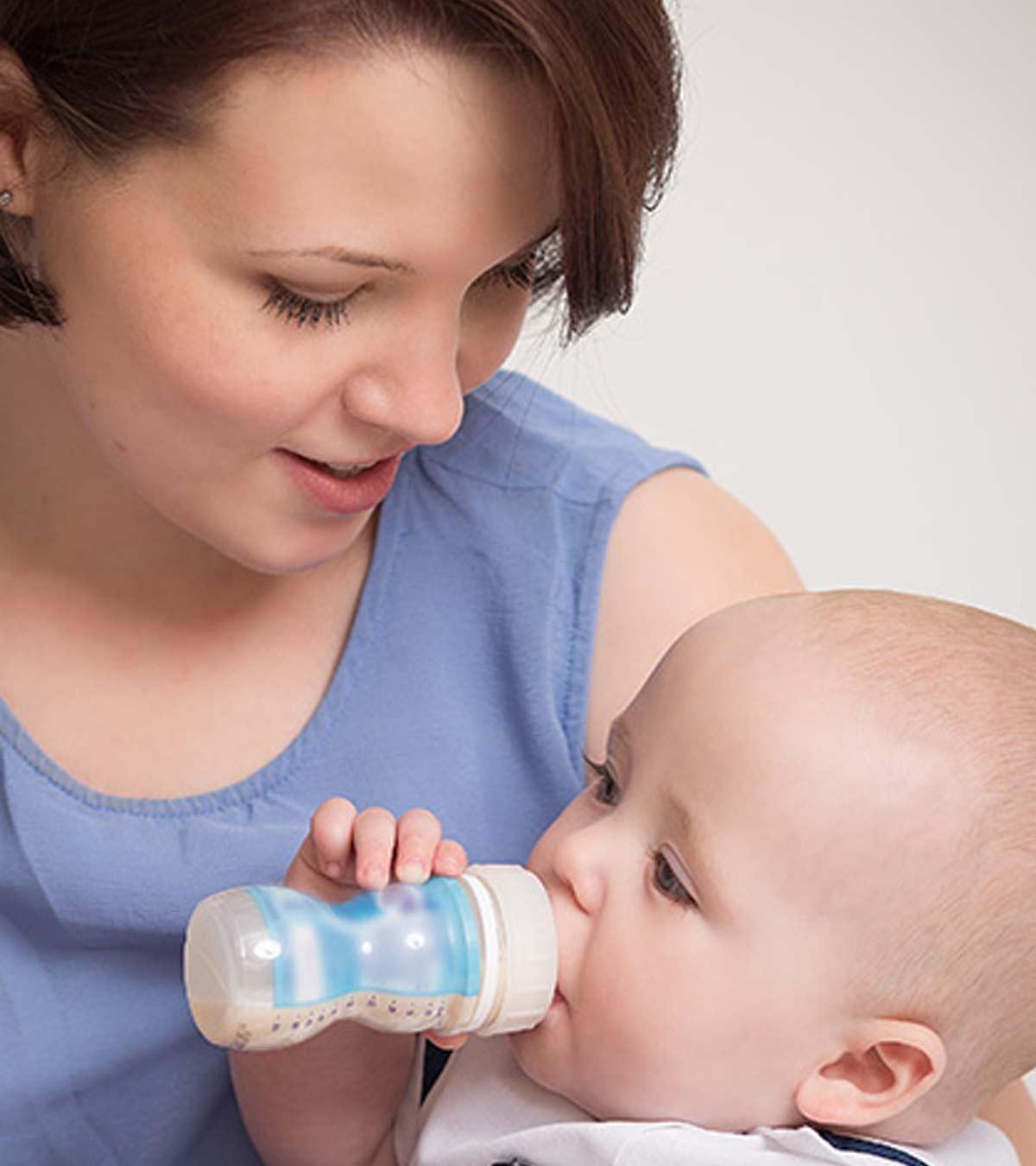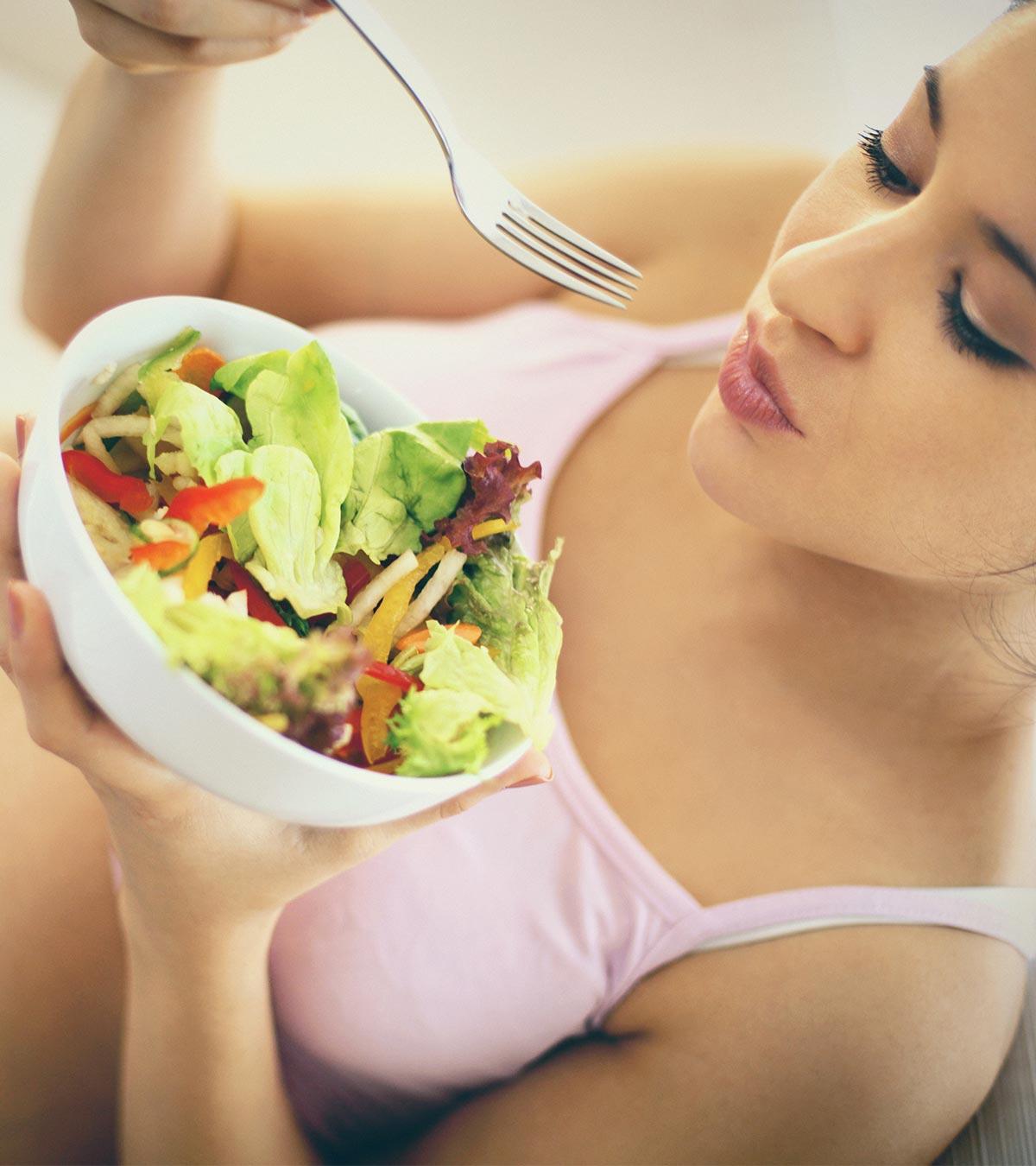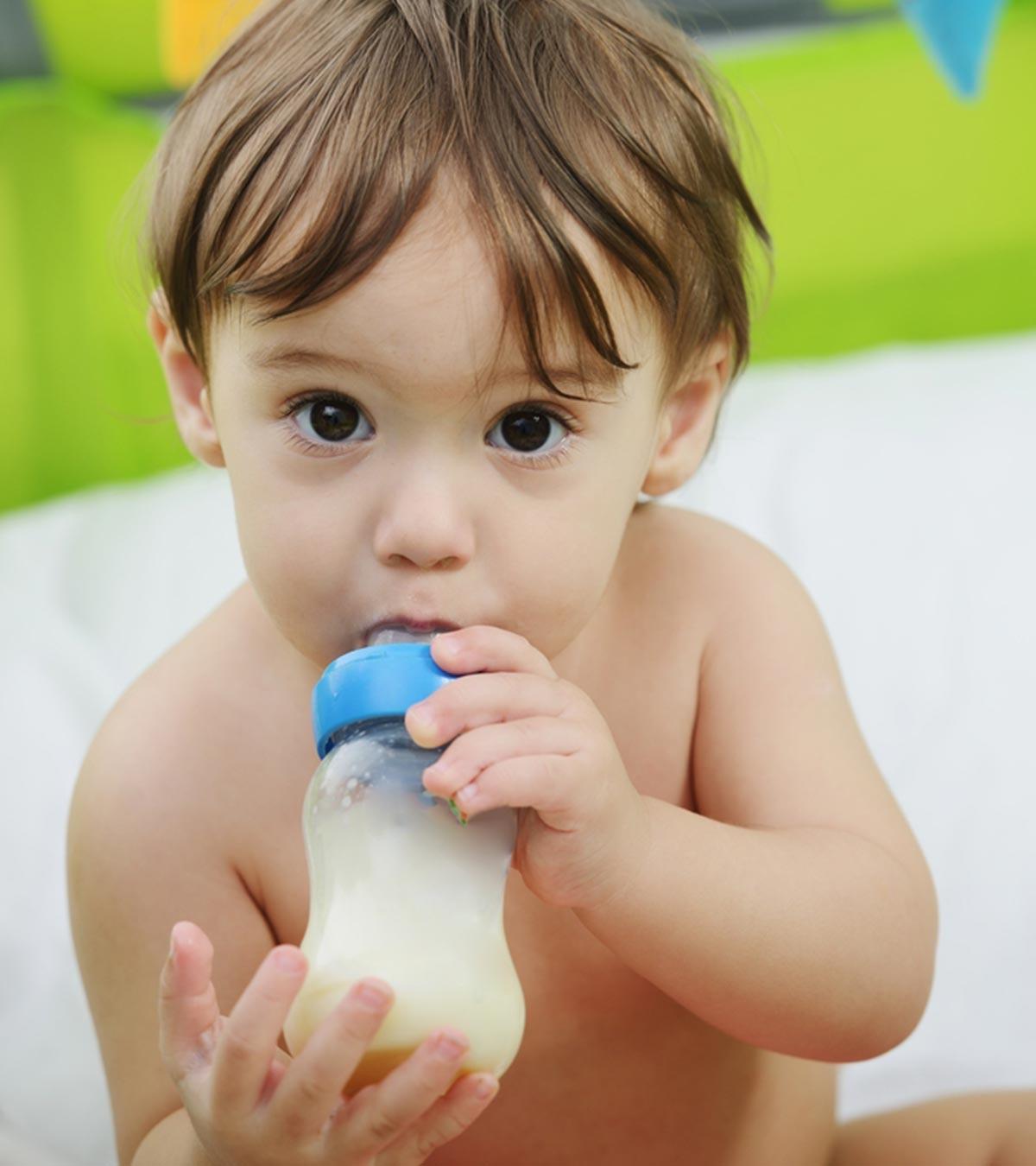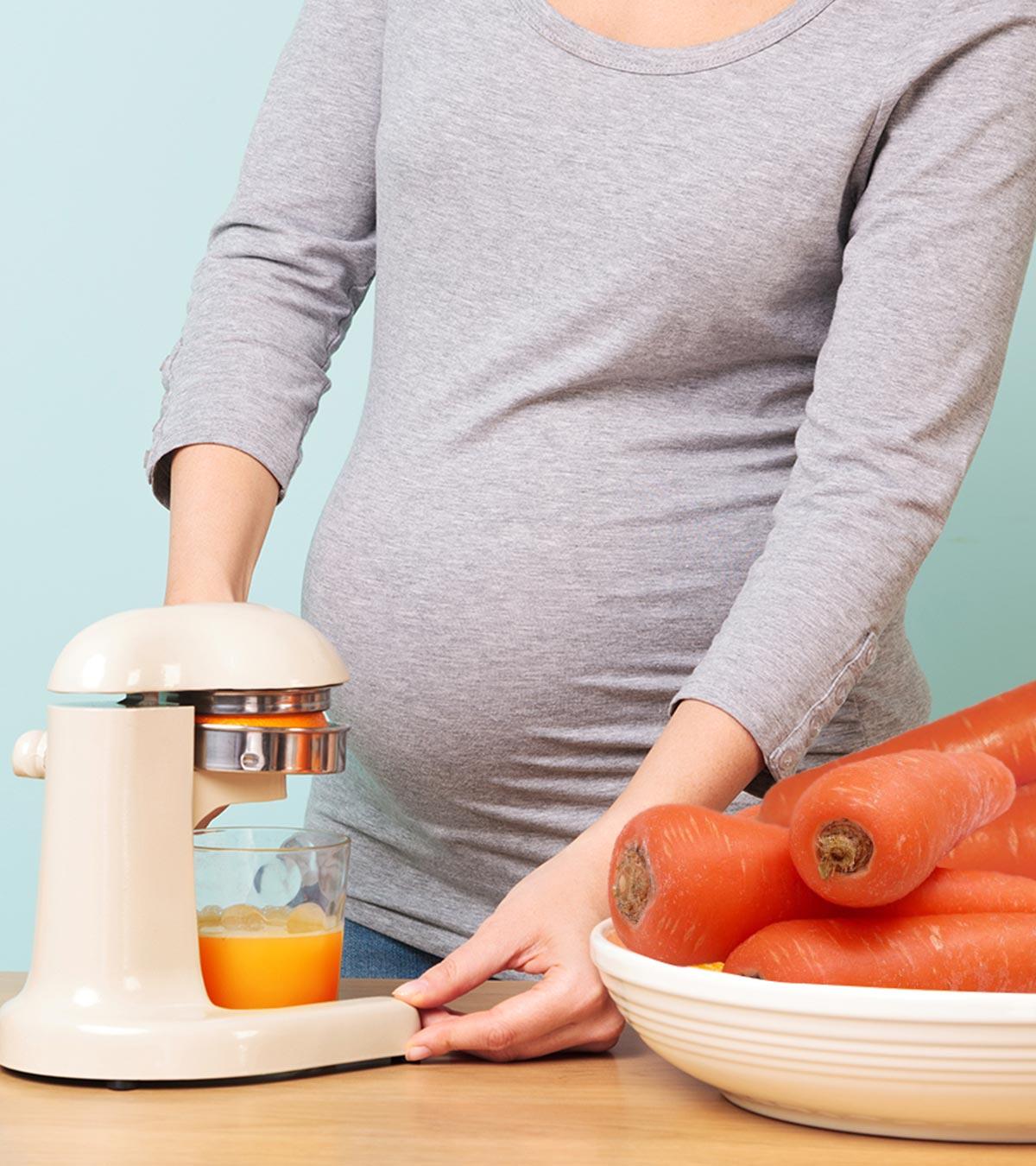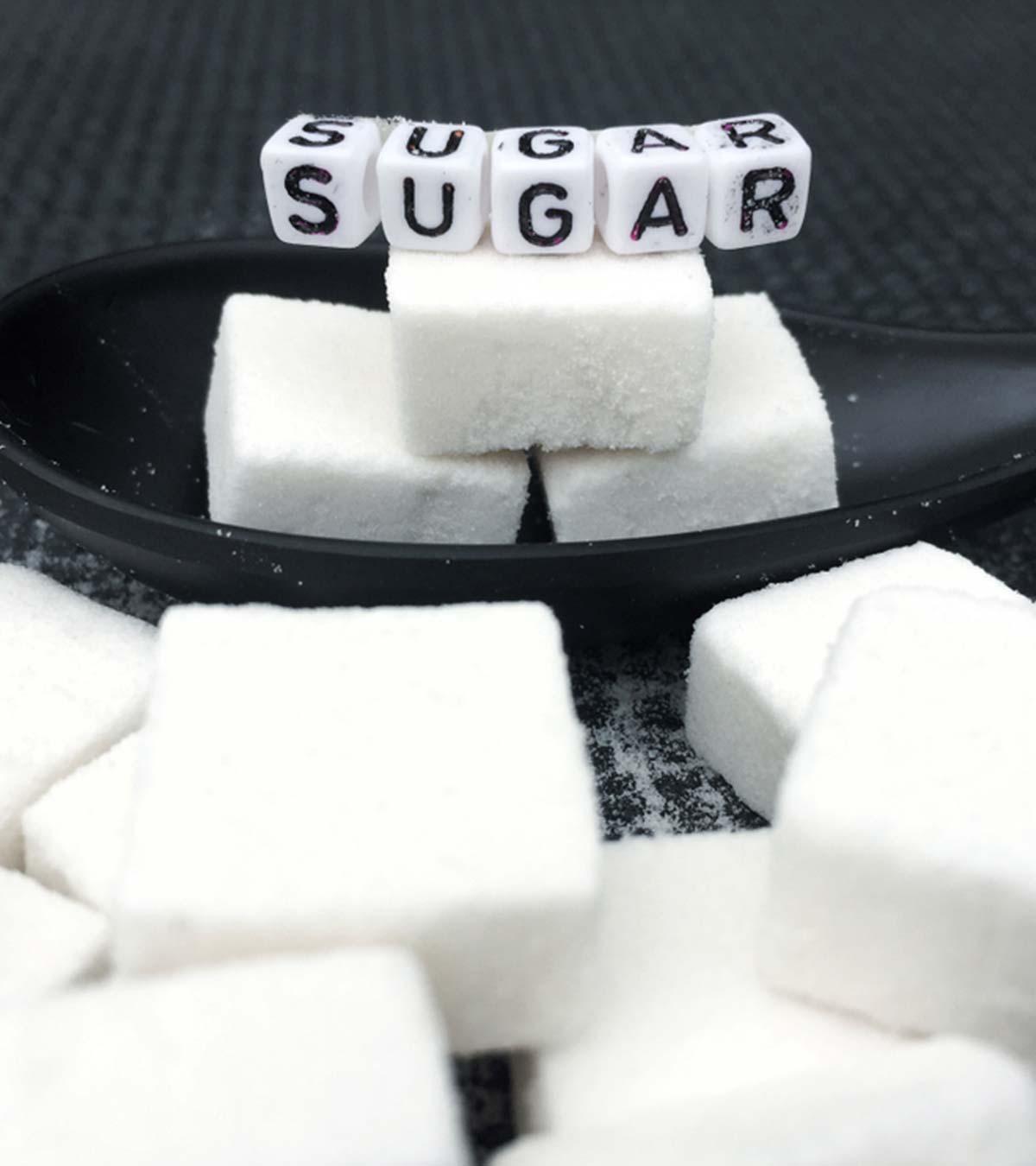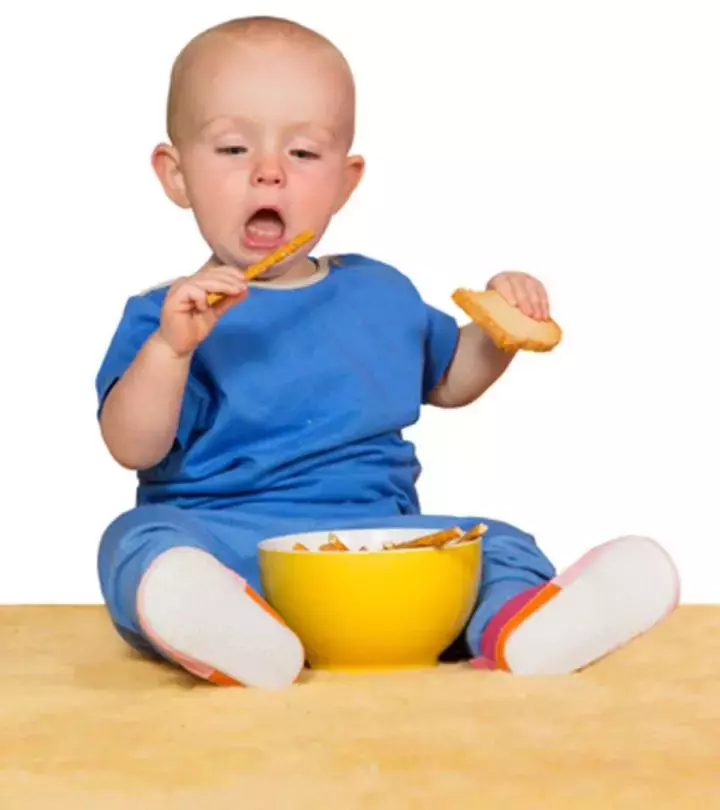
Image: Shutterstock
Your little one has just turned 13 months and is entering into the phase of toddlerhood. However, they may begin to display fussiness while eating, leaving you to think about various food ideas for a 13-month-baby that may help introduce them to a variety of nutritious foods. There may be a change in feeding habits in most babies at this age, which could be due to their altered growth patterns. They may refuse to eat the foods they used to love earlier, which could make you feel jittery, thinking they may miss out on the essential vitamins and nutrients required for their optimum growth. Altogether, a 13-month-old toddler requires appropriate nourishment to meet the needs of their constantly developing body and mind.
Dr. Leah Alexander, a pediatrician from Fairview, New Jersey, recommends, “13-month-olds should eat three meals daily plus one or two between-meal snacks. These foods should be an appropriate texture for having only a few teeth and not choking hazards (i.e., whole grapes, berries, nuts, etc.).”
Also, this is the time most babies make a shift to weaning foods from exclusive breast or formula feeding. Therefore, it is extremely important to ensure they have a well-planned, nutritious meal at all times of the day. So, keep browsing to explore various food ideas for your 13-month-old that could help you incorporate healthy foods into their routine.
Here are the top 10 ideas for 13 month old baby food:
1. Grains
Toddlers need 3 (84 grams) of grains daily. The Academy of Nutrition and Dietetics suggests that half of these grains should be wholegrains. A 1/3 cup serving of cereals, ¼ cup serving of cooked rice or pasta is equivalent to 1 ounce (28 grams). Pasta should be soft cooked and mashed with a fork.
2. Fresh Fruits
Image: Shutterstock
Fruits are the best foods to serve to your 13-month-old baby. Give seasonal fruits in abundance. Make 1 cup of fruit a part of his daily diet. Introduce orange and other acidic fruits slowly in your baby’s diet. Fresh fruits are an ideal part of a 13 month old baby food plan.
3. Juices
You can serve your child fresh fruits and juices, but avoid adding any artificial sweetener. Do not give canned juices as they contain excessive sugar and preservatives. 1 cup serving is enough for your baby. Juices are an amazing option for 13 months old baby food.
4. Meat
You can give white meat to your baby as soon as he turns a toddler. The protein in meat will supply your child with all the energy he needs to learn and play. Meat should be cooked and shredded finely. You can also puree the meat to a smooth texture. Offer him 2 ounces (56 grams) of protein-rich foods daily.
5. Vegetables
Soft cooked vegetables are great finger foods for kids. Chop raw vegetables into small pieces or steam to make them easier to eat. According to the American Academy of Pediatrics (AAP), food accounts for over 50% of choking episodes among children. Therefore, serving veggies in age-appropriate forms is essential. Carrots, sweet potatoes, squash, peas, and celery are good options. These are amazing foods for a 13-month-old baby that can be added to different cereals and grains to make baby-friendly, healthy recipes.
6. Dairy
Image: Shutterstock
When your child turns 13 months, you can continue with breastfeeding or start giving him whole milk and milk products, such as yogurt and cheese. A regular supply of calcium will support his teeth and bones. Serve the milk in a cup, not a bottle. Offer 350 to 400ml of milk daily. More than a pint of milk (plus minus 500ml) will prevent his body from absorbing iron. Also, too much milk will not leave enough room in his tummy for other foods.
Cottage cheese is a nice creamy option for babies. The little soft lumps in this cheese offer babies an opportunity to try a different texture that is easily mashable via gums. Cottage cheese is an interesting way to introduce dairy to your babies. You can try adding cream cheese to fruits in pureed or grated form. Adding cream cheese to mashed potatoes is also a hearty option. Adding a little cream cheese to your baby’s scrambled eggs can make it an interesting addition.
Sharing her 13-month-old’s diet, Kayla Buell, a mom and YouTuber, says, “As soon as she turned a year old, I dropped her morning breastfeeding session. So until she was one, I was nursing her first thing in the morning. Now, the only nursing session she has is at the night’s end before I put her to bed… At around mid-day, I give her five ounces of whole milk (i).”
 Point to consider
Point to consider7. Yogurt
If your toddler does not enjoy drinking milk, then you can offer him yogurt instead. Plain yogurt is an excellent source of protein. It also contains calcium and beneficial active cultures. 4 ounces (112ml) of yogurt is enough for a 13-month-old baby.
8. Beans
Image: IStock
Beans and legumes will be a healthy addition to your infant’s diet. A 1 ¼ serving of kidney, navy and black beans will supply your baby with a good amount of protein. Cut the beans in halves to reduce the risk of choking.
To give your little one the benefits of beans, consider giving them hummus. Hummus is easy to make and safe for your baby or toddler to eat without worrying about choking. To create baby-friendly hummus, mix chickpeas, lemon juice, garlic, ground cumin, water, and olive oil in a food processor until it’s a smooth paste. Put it in a bowl and offer it with veggie sticks or wholemeal toast fingers for a healthy snack. It’s a tasty, salt-free snack that everyone in the family can enjoy. However, it is a good idea to wait for about three to five days between each new food item. This gives you time to ensure they’re not allergic to hummus or anything new you’re feeding them (1).
9. Water
Make sure you offer water to your baby to quench his thirst. Water is great for your infant’s teeth. And it won’t add extra kilojoules to his diet.
10. Nuts
You can also introduce small amounts of creamy peanut butter in your baby’s diet. Spread a thin layer of peanut butter over a celery stick and serve to your baby. Do not give whole nuts as it can choke him.
 Experts say
Experts sayTips:
- Carefully monitor the foods that you give your baby the first time.
- Do not freak out if your baby coughs or chokes a little. But if he is coughing and frequently choking, then stop giving it right away.
- Chop the foods into toddler-friendly pieces so that he can chew it quickly.
Image: Shutterstock
- Introduce your baby to different foods at meals. Let him use his fingers to choose what he would like to eat.
Image: IStock
- Encourage your toddler to develop a taste for fresh and unprocessed foods.
- Expand your baby’s taste buds by experimenting with new spices and flavorful combinations.
 Caution
CautionFrequently Asked Questions
1. How do I sneak vegetables into food for picky eaters?
You may mash, puree, or shred veggies to sneak them into sauces, soups, smoothies, or meat preparations. However, experts advise against sneaking foods as children should consume fruits and veggies in their whole, natural form and learn to develop a healthy relationship with food (2). Sneaking one food into another hinders this process.
2. What are the healthiest vegetables for 13-month-olds?
A 13-month-old can consume all vegetables in moderation as a part of a healthy, well-balanced diet. Vegetables are a good source of fiber and essential vitamins and minerals.
3. Can babies eat too many carrots?
It is unlikely for babies to eat too many carrots. Still, it is essential to ensure your baby is consuming various veggies as a part of a wholesome diet. According to experts, consuming too many foods high in beta-carotene may cause carotenemia, where the skin turns orange or yellowish (3).
Thirteen-month babies need a well-balanced diet containing different vegetables, dairy products, fruits, and iron-fortified cereals. Offering them wholesome homemade meals and nutritious snacks will help them meet their nutritional demands. Babies may eat some foods more and refuse others, but in any case, do not force-feed them. Instead, talk to them about food to help them develop healthy relationships with foods and healthy eating practices from a young age. Also, make mealtime routines fun so your baby may enjoy eating food with family. Remember, babies take multiple tries before they develop a taste for food, so keep giving them different foods even if they did not eat them earlier.
Infographic: Easy-To-Make and Nutritious Recipes For 13-Month-Old Baby
To make your 13-month-old toddler eat a wide variety of healthy foods, you must get creative. Fortunately, making simple yet tasty meals is relatively easy. Try out the recipes in this infographic. You would be surprised to find how easily you can make meals that your toddlers will love. Illustration: Momjunction Design Team
Key Pointers
- Most babies transition from breast milk or formula to solid foods during this time.
- Include fruits and fresh juices in your baby’s daily diet.
- Shredded or pureed white meat can provide proteins and energy to your growing baby.
- Whole milk or plain yogurt are sources of protein and calcium.
- Make sure that vegetables are cooked soft and mashed to avoid choking.
Image: Stable Diffusion/MomJunction Design Team
Personal Experience: Source
MomJunction articles include first-hand experiences to provide you with better insights through real-life narratives. Here are the sources of personal accounts referenced in this article.
i. What My 1 Year Old Eats In A Day.https://youtu.be/5rCnr_0Aeps?feature=shared
References
- When, What, and How to Introduce Solid Foods.
https://www.cdc.gov/nutrition/infantandtoddlernutrition/foods-and-drinks/when-to-introduce-solid-foods.html - Should I sneak fruits and veggies into my preschooler’s food?.
https://www.healthychildren.org/English/tips-tools/ask-the-pediatrician/Pages/Should-I-sneak-fruits-veggies-into-my-preschooler-food.aspx - Can Eating Too Many Carrots Turn Your Skin Orange?
https://health.clevelandclinic.org/can-eating-too-many-carrots-turn-your-skin-orange/ - Feeding your baby: 1–2 years.Y
https://www.unicef.org/parenting/food-nutrition/feeding-your-baby-1-2-years - What to feed your baby.
https://www.nhs.uk/start-for-life/baby/weaning/what-to-feed-your-baby/over-12-months/
- When, What, and How to Introduce Solid Foods.
Read full bio of Dr. Elna Gibson
- Dr. Leah Alexander is a board-certified pediatrician who provides medical care in an outpatient setting in Fair Lawn, New Jersey. She has also been working as a pediatrician with Medical Doctors Associates at Pediatricare Associates, New Jersey, since 2005. Dr. Alexander holds a bachelor's degree in Health Science from Kalamazoo College and a Doctor of Medicine degree from Michigan State University.
 Dr. Leah Alexander is a board-certified pediatrician who provides medical care in an outpatient setting in Fair Lawn, New Jersey. She has also been working as a pediatrician with Medical Doctors Associates at Pediatricare Associates, New Jersey, since 2005. Dr. Alexander holds a bachelor's degree in Health Science from Kalamazoo College and a Doctor of Medicine degree from Michigan State University.
Dr. Leah Alexander is a board-certified pediatrician who provides medical care in an outpatient setting in Fair Lawn, New Jersey. She has also been working as a pediatrician with Medical Doctors Associates at Pediatricare Associates, New Jersey, since 2005. Dr. Alexander holds a bachelor's degree in Health Science from Kalamazoo College and a Doctor of Medicine degree from Michigan State University.
Read full bio of Swati Patwal
Read full bio of Vidya Tadapatri






